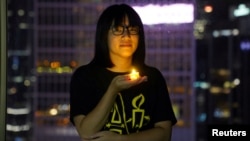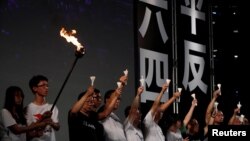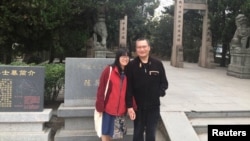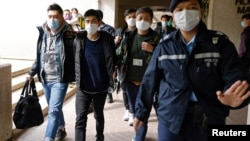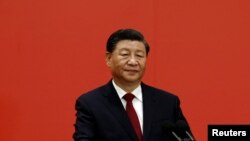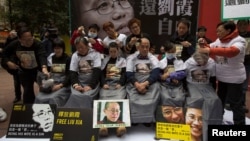It was just after sunrise when the police came for Chow Hang-tung.
The table in the room where she was working was strewn with documents as she prepared a bail application for a fellow pro-democracy activist. The 37-year-old barrister had pulled an all-nighter in her Hong Kong chambers on the 34th floor of the Bank of America Tower, where she liked to fuel herself with Japanese instant noodles and cups of instant coffee.
Suddenly, there was a loud rattling at the chambers' glass doors. Chow tapped the Facebook app on her phone and began live-streaming. Someone kept ringing the doorbell and trying to input a security code. "It looks like they've really decided to take action today," she said with a short laugh.
A short while later, several police officers burst in, handcuffed Chow and took her away. Since that day of Sept. 8 last year, she has been in detention, almost all of it at the Tai Lam Centre for Women, a maximum security prison. She is facing two national security charges, including inciting subversion, a new offense in Hong Kong that carries a maximum penalty of life in prison. In the 14 months since her arrest, she has made at least 15 applications for bail in the two cases; all have been denied. The court has yet to set a trial date.
Chow's arrest sent another tremor through Hong Kong. It was further confirmation of Beijing's plan to fundamentally alter China's freest city by rolling back civil liberties and dismantling its once vibrant pro-democracy movement, say activists, rights lawyers and foreign diplomats.
Instantly recognizable with her fringe-cut and black-rimmed glasses, Chow is now arguably the most prominent dissident voice in Hong Kong. She is one of the few activists who still openly challenge the legitimacy of China's Communist Party leaders, after Beijing launched a wide-ranging crackdown here in response to mass pro-democracy protests in 2019. Many activists, fearing long jail terms, have gone silent. Some have disavowed their involvement altogether in groups that once called for political change. Some have pleaded guilty to charges against them, hoping for lighter sentences. Others have fled abroad. And dozens of civil rights groups have shut down, fearing retribution by the Chinese authorities.
When it comes to "the ability to cower and coerce, we are no match to the communist state," Chow said in response to questions from Reuters. But, she added: "Force can only achieve so much. The state can lock up people but not their thinking, just as it can lock up facts but not alter truth. The use of force is indeed a sign of weakness, a failure of authority. The state simply has no other means to produce compliance."
Chow had been on a collision course with the Communist Party for years. In 2015, she became a leader of a group that called for the end of one-party rule. While at Cambridge University in 2009, she invited a prominent Chinese dissident to address fellow students. Earlier, as a primary school student, she began attending an annual candlelight vigil in Hong Kong to commemorate the 1989 massacre of students by Chinese troops in Beijing's Tiananmen Square. Four months before she was arrested in her office, she had told Reuters in an interview that she expected to be detained eventually.
In an act that underscored Chow's stature, Chinese authorities singled her out in a public statement the day she was arrested. The actions of Chow and others had exposed "the political nature of their anti-China chaos as well as their arrogance to challenge Hong Kong's national security law," said China's Hong Kong and Macau Affairs Office, one of Beijing's top policy-making bodies on Hong Kong.
The office of Hong Kong's chief executive, John Lee, said in a statement that it could not comment on ongoing cases. But it added that "any law enforcement actions taken by the law enforcement agencies are based on evidence" and are "strictly in accordance with the law." All defendants, the office said, had the right to "a fair trial," and cases would "never be handled any differently owing to the profession, political beliefs or background of the persons involved."
The Hong Kong Judiciary said in a statement that judges' "constitutional duty is to exercise their judicial power independently," and this included "national security cases or any other cases arising from or involving political controversies." This hadn't changed with the imposition of the National Security Law, it said.
China's State Council Information Office and Hong Kong and Macau Affairs Office did not respond to questions from Reuters.
Chow is already serving two sentences – one 12 months and the other 15 months – for unauthorized assembly connected to her involvement in organizing Tiananmen commemoration events. This relates to her work for a now dissolved group, the Hong Kong Alliance in Support of Patriotic Democratic Movements of China, that opposed one-party rule and campaigned for democracy in China. Each year until 2019, the group, commonly referred to as the Hong Kong Alliance, organized the June 4 candlelight vigil in Hong Kong, attended by tens of thousands, to commemorate the victims of the Tiananmen Square massacre. Since 2020, the government has banned the gathering, citing Covid restrictions.
The charge of subverting state power is much graver. The charge sheet alleges that Chow and two other Alliance activists, veteran rights lawyer Albert Ho and political and labor activist Lee Cheuk-yan, "incited other persons to organize, plan, commit or participate in acts by unlawful means with a view to subverting the State power, namely overthrowing or undermining the basic system of the People's Republic of China."
Chow has pleaded not guilty to the charges against her. So have Ho and Lee.
"I have done nothing wrong and do not regard myself as a criminal," she told Reuters. "And it is not just about myself, but about the hundreds of thousands of Hong Kongers who have done the same things, shouted the same slogans, pursued the same ideals. None of them are, or should be treated as a criminal."
This account of Chow's story is based on more than a dozen interviews with lawyers, labor activists, people who knew her in Cambridge, friends and activists in Hong Kong and mainland China, her fiance, and Chow herself.
She scored an unexpected victory in August, when a Hong Kong judge lifted a media reporting ban on her case after she challenged the restriction. It was the first time reporting was permitted on pre-trial hearings for a national security case in Hong Kong.
Mainland playbook
The win may be fleeting. Chow's case is part of a widening crackdown by Beijing on the legal fraternity in Hong Kong, in particular on lawyers at the forefront of the campaign for democracy and protection of the rule of law. She is one of at least eight lawyers arrested since Beijing imposed the National Security Law in June 2020. Most are veteran pro-democracy campaigners, including Martin Lee and Margaret Ng.
Legal thinkers have also been targeted. State-controlled media outlets in the city have attacked Hong Kong University law school head Fu Hualing and former law school dean Johannes Chan, who is now teaching in the United Kingdom. In a February article, the Wen Wei Po newspaper named both men in criticizing "professors and scholars" whose research "may incite students to be anti-China, anti-communism, and anti-government."
The authorities have taken steps against legal non-profits and professional bodies. The China Human Rights Lawyers Concern Group, established in Hong Kong to support human rights defenders on the mainland, voluntarily shut down late last year after receiving a police letter requesting information on the group. The Law Society, one of Hong Kong's main professional bodies for lawyers, was warned last year by Carrie Lam, the city's former leader, to keep out of politics.
"The defense of human rights by liberal-minded lawyers, the insistence that the government must respect the rights of their clients, is something that has now become an activity that is seen as politically subversive in Hong Kong," said Eva Pils, a law professor at King's College London, who focuses on human rights and the law in China.
In silencing Hong Kong's pro-democracy lawyers, Beijing is using a playbook honed on the mainland. The vaguely worded charge of subversion in Hong Kong is a recent addition to the city's statute books. On the mainland, the catch-all charge has been used for years to criminalize virtually any conduct that the authorities deem a threat to the party's absolute hold on power, according to some Chinese lawyers. Beijing is now using this and other new security offenses in its crackdown in the former British colony, as well as procedures with parallels on the mainland such as detention without bail while alleged national security offenses are under investigation.
In its statement, the Hong Kong Chief Executive's Office said that "bail application in cases concerning offenses endangering national security has been handled fairly and adjudicated impartially by the court."
In a separate case to Chow's, 47 pro-democracy campaigners are facing charges of "conspiracy to commit subversion" under the national security law. The alleged crime: participating in an unofficial, independently organized primary vote in 2020 to select opposition candidates for Legislative Council elections that were ultimately postponed by the government. Of these defendants, 34 have been denied bail and are still in detention, some for more than a year. A tentative trial date has been set for late January.
"Hong Kong's rule of law is still better than China, but the speed of the deterioration is shocking," said Teng Biao, a Chinese human rights lawyer who now lives in the United States.
A parallel crackdown on lawyers has been underway for more than a decade on the mainland. Authorities there have employed threats, disbarment, arbitrary detention, torture and imprisonment to crush legal and political challenges from hundreds of human rights lawyers and legal scholars since Chinese leader Xi Jinping took power a decade ago, according to Chinese lawyers and human rights groups. Prominent human rights lawyers including Ding Jiaxi and Xu Zhiyong have been incarcerated under similarly worded subversion laws.
"To be frank the hardship we have experienced in HK is nothing compared to what our counterparts in the mainland have suffered," Chow told Reuters. "Knowing that things can still get worse means that we must not stop fighting; knowing that people can still persist even under much direr circumstances gives us hope and strength to carry on."
One of those people is Chow's fiance, Ye Du, a prominent civil rights activist and dissident writer on the mainland. It has been four years since they last saw each other. That was the last time the Chinese authorities agreed to issue Chow with a travel permit to the mainland, Ye Du told Reuters in an interview. The chances of them meeting again soon are remote: Chow possibly faces a long prison sentence, and Ye Du is living in the southern Chinese city of Guangzhou, where he says he is under tight surveillance.
"She knows that our feelings won't change regardless of what happens because we share common values," said Ye Du, whose birth name is Wu Yangwei. "As for me, I won't change my feelings towards Hang-tung even though I live under total control now."
Activism ignited
Chow studied at Ying Wa Girls' School in the hills of Hong Kong Island. She was a star pupil, graduating in 2003 with five As in her A-level exams, according to a school magazine. That paved the way for her admission to Cambridge to study natural sciences. It was here, Chow said, that she "began to dabble in activism."
She joined the Amnesty International society on campus, floated glowing lanterns down the River Cam to commemorate the Tiananmen crackdown, and protested outside the Chinese embassy in London's Portland Place. She also invited Chinese dissident Wang Dan, who was jailed twice after the Tiananmen crackdown before moving to the United States, to the Cambridge student union. The event drew a packed crowd of largely mainland Chinese students.
After graduating with first class honors, she embarked on doctoral studies in geophysics. But Chow's focus, analyzing seismic data from the Tibetan plateau, had become mired by Chinese red tape. Protests in the Tibetan capital of Lhasa in 2008, as well as criticism of the way local officials handled the Sichuan earthquake that killed nearly 70,000 people that same year, prompted authorities to restrict information and access to parts of western China.
"The research that we did was suddenly suspended by the Chinese government," Chow said in an interview in May 2021 in her chambers, where books by dissidents such as Alexander Solzhenitsyn could be seen in the hallway. "Although you wouldn't necessarily say it was a crackdown, this was the first time I felt the government's power, with direct effects."
Chow met with her doctoral supervisor to discuss her future. "It was obvious that her interests had gone to other areas," Keith Priestley, now a retired emeritus professor, said in a phone interview. "She stated her passion for working on human rights activities and decided that the law was more in keeping with her interests than geophysics. I respected that."
Chow returned to Hong Kong in 2010 and joined Labour Action China, a group that helps mainland factory workers seek legal recourse for occupational injuries, including the lung disease silicosis. Her first week there, she was assigned to monitor a court case in a factory town in China's southern Pearl River Delta.
"I was clueless on what was going on," she recalled in the 2021 interview, adding that she had no idea how to write a submission in support of the worker. That experience, she said, would lead to her studying law.
Shek Ping-kwan, the program coordinator of Labour Action China, said Chow's fluency in Cantonese, Mandarin and English and analytical mind proved to be assets, making her a bridge between Chinese workers, mainland officials and foreigners. "She could join anyone for a chat, a smoke or a drink," said Shek. "She had no airs."
In Hong Kong, Chow organized dinners of spicy hotpot where the high-octane Chinese spirit baijiu flowed freely. The meetings brought together a diverse crowd, her friends said.
She also showed an obstinate side. One friend recalls a grueling group hike in the hills of Hong Kong where she insisted on sticking to a tough but more scenic route over the protests of others. "We agreed on this plan, so we're going to finish it," the friend recalled Chow saying.
'Full circle'
She began studying law part-time in 2011, taking evening classes in Hong Kong. She also became increasingly involved in the human rights work of the Alliance, especially efforts to free the dissident writer and activist Liu Xiaobo and Liu Xia, his wife. Along with other activists in Hong Kong, Chow shaved her head in 2014 in solidarity with Liu Xia, who was under house arrest at the time and reportedly suffering from severe depression. Liu Xia now lives abroad.
In 2015, she became vice chairperson of the Alliance, taking on a more public role. Things had come "full circle," she told Reuters. "I began joining the Alliance's annual candlelight vigil since I was a primary school kid; the story of what happened on Tiananmen opened my eyes to the evils in this world."
The next year, Chow was admitted to the Hong Kong Bar. She would soon be representing her fellow activists.
With the imposition of the National Security Law in June 2020, police began arresting Hong Kong's leading pro-democracy figures. Chow turned her attention to defending some of them, often working pro bono, according to two colleagues. Her clients included Gwyneth Ho, a former reporter who was one of the 47 activists detained for running in the primary vote in 2020. It was a bail request for Ho, who is still in detention, that Chow was preparing when she was arrested in September last year.
The National Security Law was enacted to "restore the enjoyment of rights and freedoms" that many people living in Hong Kong "had been unable to enjoy during the period of serious violence" between mid-2019 and early 2020, the Hong Kong Chief Executive's Office said in its statement. The law, it said, had "swiftly and effectively restored stability and security."
Chow kept a sleeping bag in her office and often worked through the night, recalls a fellow barrister who asked not to be named. To keep her energy up, she would nosh on junk food. "When you smelled the cup-noodle odor in the morning, you would know she'd been working through the night again," the barrister said.
It was her pro-democracy work that brought her together with Ye Du, the mainland activist. They have played out parts of their romance in public.
In a letter to Ye Du last year, which was published in Hong Kong's Ming Pao newspaper, Chow described the first time she visited him in Guangzhou in 2012. She recalled how he'd pointed out the surveillance cameras outside his home, the police sentry box built to monitor him, and a tall plain-clothes police officer monitoring the couple while they ate meals together. Through her relationship with Ye Du, Chow said, she had learned how to coexist with "big brother" surveillance.
On July 13 last year, Ye Du asked Chow to marry him. The date wasn't random – it was the fourth anniversary of the death of Liu Xiaobo. Liu, a Nobel Peace Prize laureate who died in jail of cancer, is an iconic figure in the pro-democracy movement.
In his proposal letter to Chow, which was also published in Ming Pao, Ye Du included a poem he'd composed.
Tung, are you willing to marry me?
Are you willing to hold my hand for the rest of my life?
No more barren land
May flowers bloom on the burning thorn road
"For you to propose at this moment, you must be ready to face all difficulties," Chow wrote in reply. "If you're ready, then let me join you in your craziness."
By now, Chow had become the face of resistance to China's crackdown in Hong Kong – and an almost lone opposition voice. "I've been expecting to be put into prison," she told Reuters in the May 2021 interview.
Her public profile rose last year when she gave multiple interviews criticizing the government, including its decision to ban the Tiananmen vigil. Police detained her on June 4, the day the vigil would have been held. She was charged with inciting an unauthorized assembly and later released on bail.
Under intense pressure from authorities, the Alliance disbanded in September last year, a few weeks after Chow was arrested in her office. She and four other Alliance members were also charged under the national security law for failing to comply with a police order to submit information about the group's membership, finances and activities. The group was accused of being "an agent of foreign forces" and its assets of HK$2.2 million ($280,000) were frozen.
Yiu-Leung Cheung, a barrister at Harcourt Chambers, where Chow was working when she was arrested, says jail time doesn't scare her. "Her real fear is the whole world becoming indifferent to this increasing abuse," he said.
In jail, Chow is allowed two visits a month from family members and friends. She doesn't have access to a computer or the Internet but can read newspapers and watch a limited number of TV channels. Hong Kong's Correctional Services blocked her from receiving books with political themes, including on the Tiananmen crackdown, sent by friends, Chow said in an online post. The prison authorities also confiscated more than 30 letters sent to her, she said on social media. Chow's online accounts are managed on her behalf.
Chow herself downplays her incarceration. "In a sense," she told Reuters, "isn't the authoritarian state itself a bigger prison?"
Hong Kong's Correctional Services did not respond to questions from Reuters.
New battleground
Chow is using the courtroom as her new political battleground. During an appearance in May, she shouted from the dock: "Do not forget June 4th. Resist till the end!" She held up a sheet of paper with the slogan "89 64 truth," a reference to the date of the Tiananmen crackdown – June 4, 1989.
On Sept. 2, she appeared for a preliminary hearing in her subversion case. "It's impossible to plead guilty," she said, addressing the magistrate in Cantonese. "Pursuing democracy is not a crime. I plead not guilty."
Convincing the judges isn't necessarily Chow's aim. It is "about seizing on the few spaces left to publicize the goals and position of the movement," she said. "So long as the state is not yet willing to abandon the legitimacy that comes with an open court, the courtroom will remain (one of) the few public spaces where officially 'criminal' thinking must be given air time."
August 4 this year was the Qixi Festival, commonly known as the Chinese Valentine's Day. That day, Ye Du said he hiked up to a 5000-meter-high mountain pass on the eastern edge of the Tibetan plateau, where he held up a red agate ring purchased from the nearby Derge Parkhang printing house and snapped a picture. "I hope to put this on her finger sometime in the future," he wrote on Facebook.
"The Chinese authorities are very mad about our relationship," he told Reuters. "Under a totalitarian regime, to safeguard our relationship and ideals is not an easy thing. But we have faith."
Chow is also philosophical. "To be honest it is very difficult to have any concrete plan about the future," she said. "I do not even know if we can even touch each other again."
But, she added: "The uncertainty over our future only means that we should redouble our effort to end one party dictatorship, does it not?"




